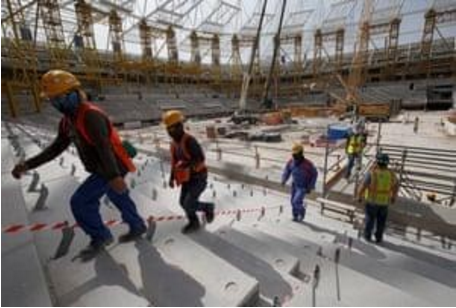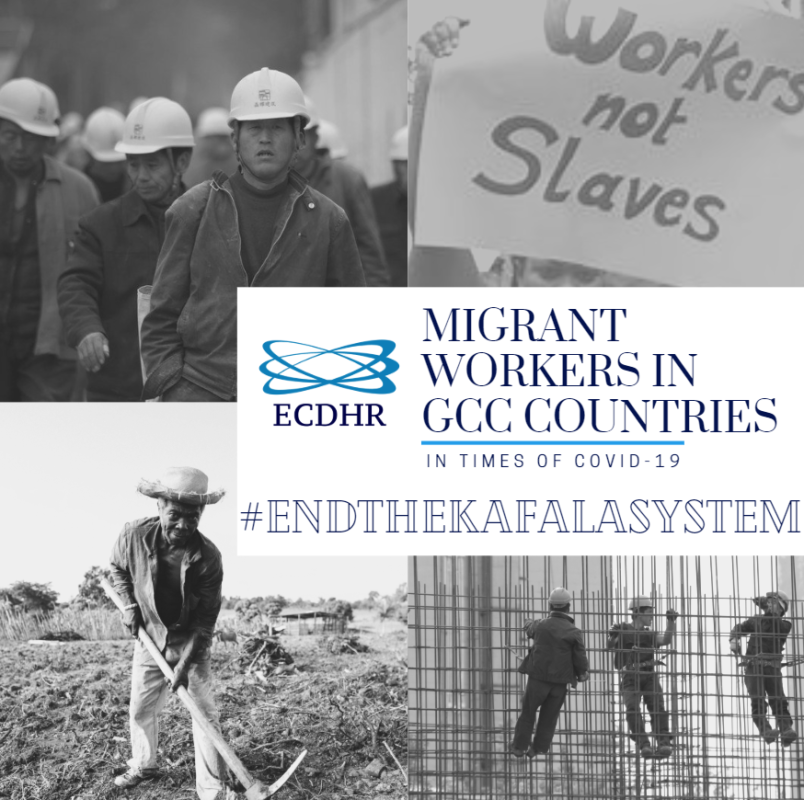The presence of migrant workers in the member states of the Gulf Cooperation Council (GCC), has been a problematic issue for decades. The current wave of migration has its roots in the 1960s in large part due to the oil boom, and it intensified during the 1970s and 1980s. During that period, it was primarily persons from surrounding Arab countries who migrated to the Gulf region. Today, however, migrant workers typically hail from South Asia, particularly from India, Bangladesh, or Pakistan; from South-East Asia, as well as from various African countries.
Indeed, migrant workers constitute a large percentage of the overall population of each of the GCC states. For instance, in Qatar and the UAE, around 90% of the population are foreigners; in Kuwait two-thirds, in Bahrain and Oman half; and in Saudi Arabia one third. The GCC countries are therefore characterized by their high levels of remittances, money sent by migrant workers back to families in their countries of origin.
Migrant workers are particularly involved in the construction sector, sanitation, transportation, hospitality, and health care, as well as in the domestic sector. Many of these workers are low-skilled but contribute in a substantial way to the economic prosperity and development of their host countries. For example, one of the main works of the GCC in which migrants are currently involved starting from May 2020, involves the construction of stadiums to host the 2022 World Cup in Qatar, the structures of Expo 2020 in Dubai (currently estimated to bring $ 33 billion to the economy of the United Arab Emirates), as well as facilities to host the G20 summit in Riyadh in November.
Abuses inherent to the system
Prospective migrant workers are lured under false pretences of economic prosperity. Foreign workers are confronted with high risks, low wages, exploitation, and abuse. These abuses can be psychological, verbal, physical, or even sexual, particularly in the case of female domestic workers. Labour abuse of migrant workers became a particularly pressing issue during the 2010s, when Human Rights Watch published a report highlighting the stark reality faced by many, particularly in the construction sector.
Employment of migrants throughout the GCC countries takes place under the framework of employer sponsorship, otherwise known as the kafala system. Under the kafala system, a relationship of dependency is created between the migrant worker and the employer or sponsor: the migrant worker is not permitted to change work or leave the country without explicit written permission. The kafala system, therefore, makes it easier for sponsors to escape legal consequences for the abuse of migrant workers that happens under their purview.
Growth and prosperity in the GCC economies can be viewed as intrinsically linked to the abuse and hard labour off migrant workers’ backs, and awful hardships they face in daily life. For instance, the UAE government currently continues to ban trade unions and strikes by workers, making it close to impossible to enact much-needed change to benefit the situation of migrant workers. This tacit acceptance renders the GCC member states in violation of the Convention Against Torture and Other Cruel, Inhuman, or Degrading Treatment or Punishment, the International Covenant of Economic, Social and Cultural Rights, as well as the International Covenant on Civil and Political Rights.
The preparation of the 2022 World Cup in Qatar has raised international attention to the abuses and rigid conditions that migrant workers regularly face. An exclusive story was published in The Guardian in 2013, describing the stark conditions of migrant workers, especially evidence of forced labour. One migrant worker recalled that they had been working on an “empty stomach” for 24 hours, and when he complained, he was assaulted by his manager. Workers claimed that they did not have free access to drinking water in the desert heat. Between 4 June and 8 August 2013 at least 44 workers died. More than half died of heart attacks, heart failure, or accidents at work. This state of affairs has continued to this day, apart from incremental changes. In response to this state of affairs, Amnesty International in 2019 campaigned to raise to the attention the plight of migrant workers constructing the stadiums, and labels the kafala system as being “at the heart of the abuse”.

The Coronavirus Context
The ongoing outbreak of COVID-19 is worsening the already vulnerable position of migrant workers in the Gulf. Due to the pandemic, many migrants have lost their jobs and therefore currently have to rely on charities. Migrant workers are disproportionately affected by COVID-19, compared to the native populations of Gulf countries. This stems from the systemic health and socio-economic disparities that have existed for decades before the current outbreak.
Another aspect of the conditions exacerbated by COVID-19 that migrant workers face is the stark overcrowding of accommodation, which poses a potent public health risk. For instance, a potential hotspot is the Industrial Area, a working-class area in Doha, Qatar, where often eight migrant residents sleep per room, with dozens of men sharing bathrooms and kitchens.
Amidst the context of the virus, the UAE and Kuwait have engaged in a repatriation plan of foreign nationals. They have also planned on imposing restrictions on countries unwilling to take back their nationals in the fears of overflowing an exponentially decreasing labour market. However, according to Hiba Zayadi, Human Rights Watch’s Gulf Researcher, these attempts by Gulf states to rush the return of migrant workers to their countries of origin is “an attempt to wash their hands of the responsibility for them”.
Conclusion
In the wake of the COVID-19 pandemic, the GCC states need to make necessary reforms for the benefit of migrant workers’ lives. These include the improvement of health and safety standards, living conditions, the legal pursuit of employers who abuse physically, psychologically, and sexually their employees, as well as the overall abolishing of the kafala system. The outbreak of COVID-19 in the Gulf is an opportunity for real change, for migrant workers in particular and human rights and democracy in general.

